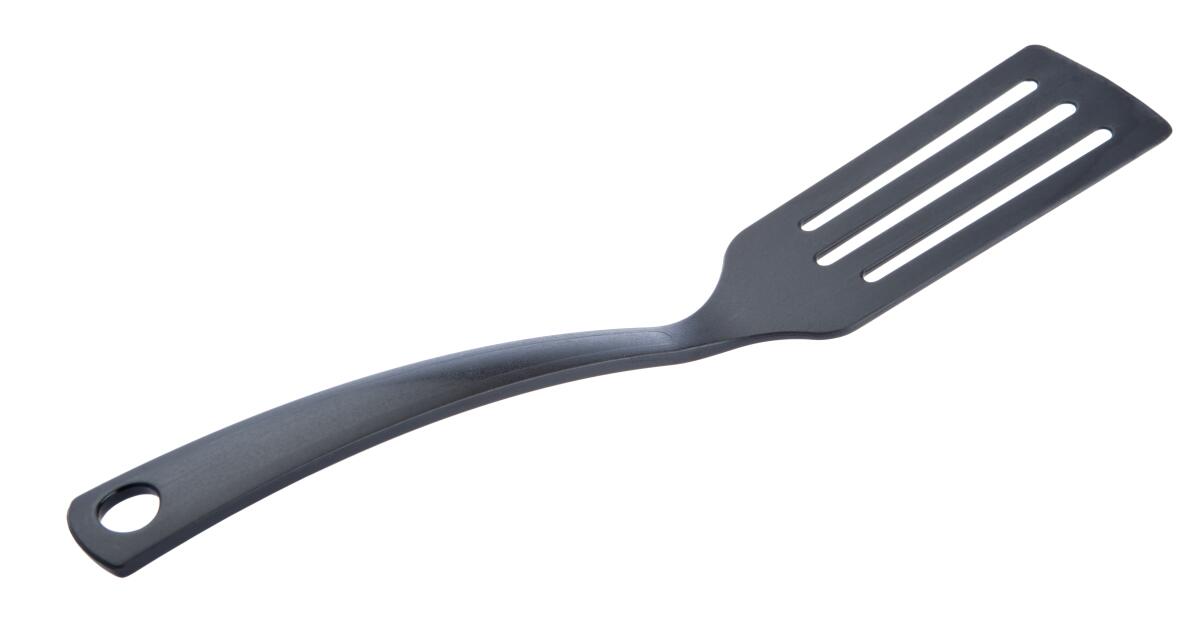Go to your kitchen, grab your black spatula and throw it in the trash. Immediately.
That's the alarming message of a new study published in the journal Chemosphere. Cooking with plastic utensils has long been considered a concern because heat can cause chemicals in the plastic to leach into the food you're eating. But researchers now say products made from black plastic contain even more toxic recycled ingredients.
Authors of the Chemosphere study found that everyday household items made from black recycled plastic, including kitchen utensils, take-out containers, toys and hair accessories, are likely to contain dangerous levels of flame retardants and other toxic chemicals.
Flame retardants find their way into our most commonly used items because these black-colored products are made from recycled electronic waste such as discarded televisions and computers, which often contain these additives.
If you use a black plastic spatula when flipping your pancakes, like any other plastic cookware, the heat can cause any flame retardant present in the spatula to leach into your flatbreads.
“This is because flame retardants are not actually bound to the plastic polymers they are added to, but rather it is an additive. “And heat can facilitate the migration of chemicals from products,” said Megan Liu, co-author of the study and science and policy manager for Toxic-Free Future.
The toxic chemicals are not found in every black item – for example, you won't find them in a black silicone spatula. They are also not included in every black plastic item. The problem is that you can't tell which plastic ones are risky and which ones aren't.
Why get rid of them now?
If you look at your black plastic products and think, “I've been using them for so long and I'm fine,” Liu says these products have a long lifespan.
Cooking with a black plastic product every day can lead to increased exposure to toxic chemicals over time.
Toys with black plastic can be even more harmful to young children whose bodies are still developing.
Liu said studies have shown that toxic chemicals from children's toys can leach into their saliva when they put the products in their mouths.
“It's really concerning when you think about flame retardants because they're known to build up in our bodies,” she said.
Experts agree that there is no safe limit for these flame retardants.
The buildup can lead to a variety of health problems, including increased risk of cancer, hormone disruption, effects on fertility, and damage to the brain and nervous system.
How do you know a product is harmful?
It is almost impossible to know if a black plastic product is contaminated. This is because these products that contain recycled e-waste do not disclose a detailed list of all ingredients and contaminants in the product.
Liu said it is also unclear how many types of flame retardants are contained in these black plastic products.
Some of the products researchers tested in this current study “contained up to nine different harmful chemicals and harmful flame retardants,” she said.
What can you do about it?
Experts advise consumers to avoid buying black plastic cookware or other products if possible. If you have some products in your kitchen or home, you are advised to throw them away.
There are many restaurants that place their to-go orders in black plastic containers. If you receive food in one of these containers, do not use it to reheat the food or your leftovers, but transfer the food to glass or ceramic containers.
“Sushi trays were one of the highest standards [a] Flame retardant called Deca-BDE [Decabromodiphenyl ether]which is really concerning because it has actually been phased out and banned in the U.S. for several years,” Liu said.
The U.S. Environmental Protection Agency banned the use of deca-BDE in 2021 after the chemical was linked to cancer, endocrine and thyroid problems, and a variety of other illnesses.
What are safer alternatives?
The safest non-toxic material options for kitchen utensils are wood and stainless steel.

Bir yanıt yazın